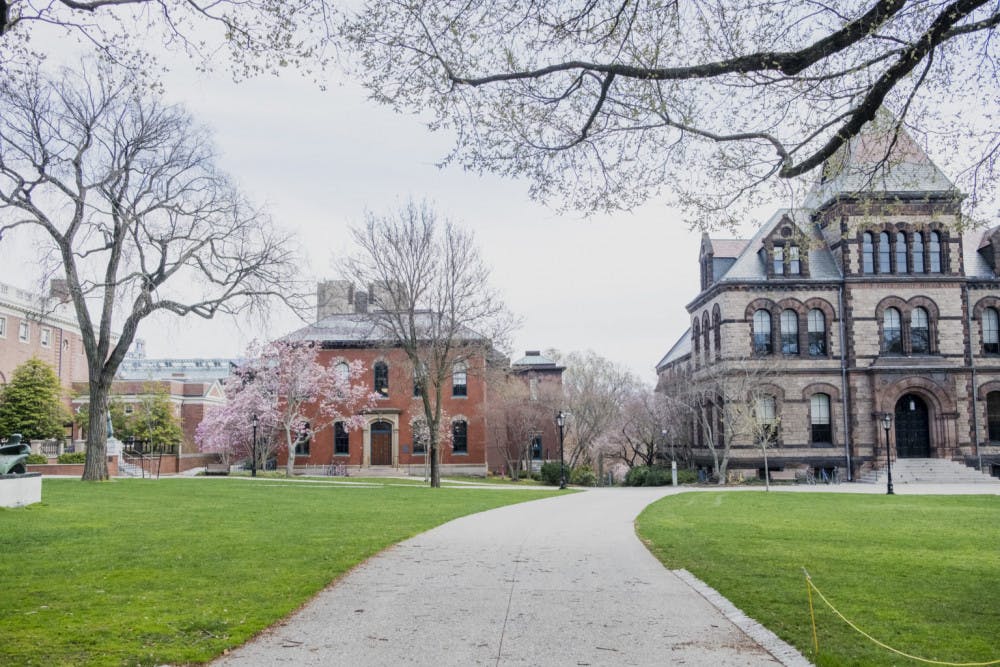The University’s Office of Admission will resume in-person campus tours and some high school visits this fall, according to Dean of Admission Logan Powell and an email to the student body from Executive Vice President for Planning and Policy Russell Carey ’91 MA’06 last month.
Public health guidance, nationwide vaccination rates and vaccination levels for students, faculty and staff played a key role in bringing back a staple of the college process that has been on pause since March 2020, Powell said.
“Everything we were considering had to have the health and safety of both current and prospective members of the Brown community in mind,” he said. “We were going to defer to public health experts to provide the guidance we would need to finally authorize campus tours.”
But the decisions also come with limitations and caveats that mark the uncertain state of the COVID-19 pandemic — and other pandemic-era admission policy remains up in the air.
Tours, mainly conducted outside, will begin again with the start of the fall semester, but participants will be required to confirm their vaccination status. Unvaccinated tour goers will be required to wear masks, according to Carey’s email.
For tour guides — such as tour coordinators Claire Brown ’22 and Josh Neronha ’22, who work alongside the Office of Admission to lead the student side of campus visits — a number of specifics, such as timing and routes, are still to be determined. But Brown and Neronha said that the prospect of restarting in-person tours is exciting.
“I love to talk to prospective students. I love walking around and giving tours,” Brown said. “Right now, all of the prospective students, they’re muted with cameras off — it’s just me talking to myself, and the only way to talk to them is if they submit a question in the chat.”
“With all of the precautions the admission office is taking, I feel good,” Neronha said. Neronha added that he would lead a tour the “first chance” he gets, but the decision to return to in-person tours versus continuing online tours will ultimately lie with each tour guide.
Both of the guides emphasized the strengths of virtual tours in making the University accessible to students who might otherwise not get the chance to visit. The information shared on the tours, Brown said, is roughly the same whether a tour guide is sitting in front of a camera or standing on the main green.
Still, Neronha admitted that the in-person experience is preferable.
“Being on campus and being able to walk around and get a feel for the culture of the school is so important in figuring out if it’s right for you,” he said.
For some tour guides hired since the pandemic’s onset, the fall will mark the first time they interact with visitors in person, meaning some training will be in store, Brown said. The pause in tours also marks something of an opportunity, Brown and Neronha added: The University can rethink parts of its tour.
The most common request for additions to the tour, Brown said, is the opportunity to see inside a dorm — something that the University can’t accommodate. But pre-pandemic, student coordinators had planned to redesign the tour route, and resuming tours may lead the office to take on the task, she said.
“A lot of things will be on the table,” Neronha added. “The college tour has been what it’s been for practically forever.”
The University, Powell added, will look to create more “robust programming” for prospective students visiting College Hill than it usually does in an effort to mitigate the lost winter and spring for rising high school seniors.
“This group has not been able to visit campuses, really at all,” he said. “It’s nice when we can go and visit a high school, but it’s probably more beneficial for those students to visit us.”
Those opportunities will take the form of more weekend events, tours and outreach from the Office of Admission, Powell said. The University will not subsidize travel for prospective students visiting campus before they apply, in contrast to the financial assistance it typically provides for admitted students to attend A Day on College Hill in the spring.
While tours resume, information sessions for prospective students, which have traditionally taken place indoors, have not received the go-ahead to restart, Powell said.
Travel by admission officers will also not return in its full-fledged pre-pandemic form, Powell said. The Office of Admission will look at vaccination rates within states and the policies of individual high schools in deciding where to send admission officers. The office will also consider which students are less likely to get to visit campus in deciding high school visits, but international travel appears to be off the table until next spring, he added, citing slower vaccination rates in a number of countries outside of the United States.
“We are absolutely going to be on the road. We are absolutely going to visit high schools, to try to see students where they are,” Powell said.
“Some staff members are just ecstatic about getting on a plane and flying just about literally anywhere because we’ve been trapped in our Zoom bunkers for a year and a half,” Powell said — but others are “more cautious.”
Standardized testing policy, perhaps the most significant decision the Office of Admission has ahead in the coming year, remains unchanged according to Powell. Applicants to the class of 2026 will not be required to submit an ACT or SAT score, but the University has yet to make a decision about rising high school juniors, who will apply in fall 2022 to the class of 2027.
“We need to get into this year and see what impact a test-optional policy has,” Powell said, noting that unlike last fall, he is “hopeful” that applicants this year who want to take the SAT or ACT will be able to. Powell noted that, as always, the decision has roots in Ivy League athletics: While the University must make its decision independently of other institutions, it also must understand the impact it will have on “other members of the conference.”

Will Kubzansky was the 133rd editor-in-chief and president of the Brown Daily Herald. Previously, he served as a University News editor overseeing the admission & financial aid and staff & student labor beats. In his free time, he plays the guitar and soccer — both poorly.





